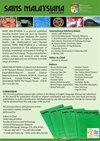The Effects of Abelmoschus esculentus (L.) Moench Seed on High Fat Diet Induced Metabolic and Cognitive Impairments in C57BL/6J Mice
IF 0.7
4区 综合性期刊
Q3 MULTIDISCIPLINARY SCIENCES
引用次数: 0
Abstract
Okra is known for its neuroprotective and antioxidant properties. We aimed to investigate the potential effects of okra seed powder in alleviating high far diet (HFD) induced cognitive deficit and hypercholesterolemia. We randomly allocated thirty-six C57BL/6J male mice into: (i) control, mice fed with a normal fat level diet; (ii) HFD, mice fed with HFD; (iii) HFD-OS1; (iv) HFD-OS2; (v) HFD-OS3, mice fed with HFD and okra seed powder (200, 400, or 800 mg/kg/day, respectively); (vi) HFD-SIM, mice fed with HFD and simvastatin (20 mg/kg/day). After 10 weeks of treatment period, the mice were tested with an episodic-like memory test (EMT) and Morris water maze (MWM). We found significantly higher total and LDL cholesterol levels in mice fed with HFD. Compared to the HFD group, the control group performed better in the EMT test, and also learned and retrieved spatial reference memory better in the MWM test. The okra seed powder significantly improved spatial learning in four days of acquisition trials and the highest dose of okra profoundly improved spatial reference memory retention during the probe trial. Contrary to the MWM results, the okra-treated animals did not perform significantly better than the HFD-treated animals in EMT. At present, we recommend future studies testing the potential neuroprotective or cognitive enhancing effects of okra to assess different cognitive domains using various disease models to have a better understanding on the potential neuroprotective properties of okra.绿僵鼠(L.)的防治效果高脂饮食对C57BL/6J小鼠代谢和认知损伤的影响
秋葵以其神经保护和抗氧化特性而闻名。我们的目的是研究秋葵籽粉在缓解高脂饮食(HFD)诱导的认知障碍和高胆固醇血症中的潜在作用。我们将36只C57BL/6J雄性小鼠随机分为两组:(i)对照组,喂食正常脂肪水平的饲料;(ii) HFD,饲喂HFD的小鼠;(3) HFD-OS1;(四)HFD-OS2;(v) HFD- os3,分别饲喂HFD和秋葵籽粉(200、400、800 mg/kg/d);(vi) HFD- sim, HFD +辛伐他汀(20mg /kg/d)喂养小鼠。治疗10周后,进行情景样记忆测试(EMT)和Morris水迷宫测试(MWM)。我们发现喂食HFD的小鼠的总胆固醇和低密度脂蛋白胆固醇水平显著升高。与HFD组相比,对照组在EMT测试中表现更好,在MWM测试中学习和检索空间参考记忆也更好。在4天的习得试验中,秋葵籽粉显著提高了空间学习能力,在探针试验中,最高剂量的秋葵籽粉显著提高了空间参考记忆的保留。与MWM的结果相反,秋葵治疗的动物在EMT中的表现并不明显好于hfd治疗的动物。目前,我们建议未来的研究测试秋葵潜在的神经保护或认知增强作用,利用各种疾病模型评估不同的认知领域,以更好地了解秋葵潜在的神经保护特性。
本文章由计算机程序翻译,如有差异,请以英文原文为准。
求助全文
约1分钟内获得全文
求助全文
来源期刊

Sains Malaysiana
MULTIDISCIPLINARY SCIENCES-
CiteScore
1.60
自引率
12.50%
发文量
196
审稿时长
3-6 weeks
期刊介绍:
Sains Malaysiana is a refereed journal committed to the advancement of scholarly knowledge and research findings of the several branches of science and technology. It contains articles on Earth Sciences, Health Sciences, Life Sciences, Mathematical Sciences and Physical Sciences. The journal publishes articles, reviews, and research notes whose content and approach are of interest to a wide range of scholars. Sains Malaysiana is published by the UKM Press an its autonomous Editorial Board are drawn from the Faculty of Science and Technology, Universiti Kebangsaan Malaysia. In addition, distinguished scholars from local and foreign universities are appointed to serve as advisory board members and referees.
 求助内容:
求助内容: 应助结果提醒方式:
应助结果提醒方式:


